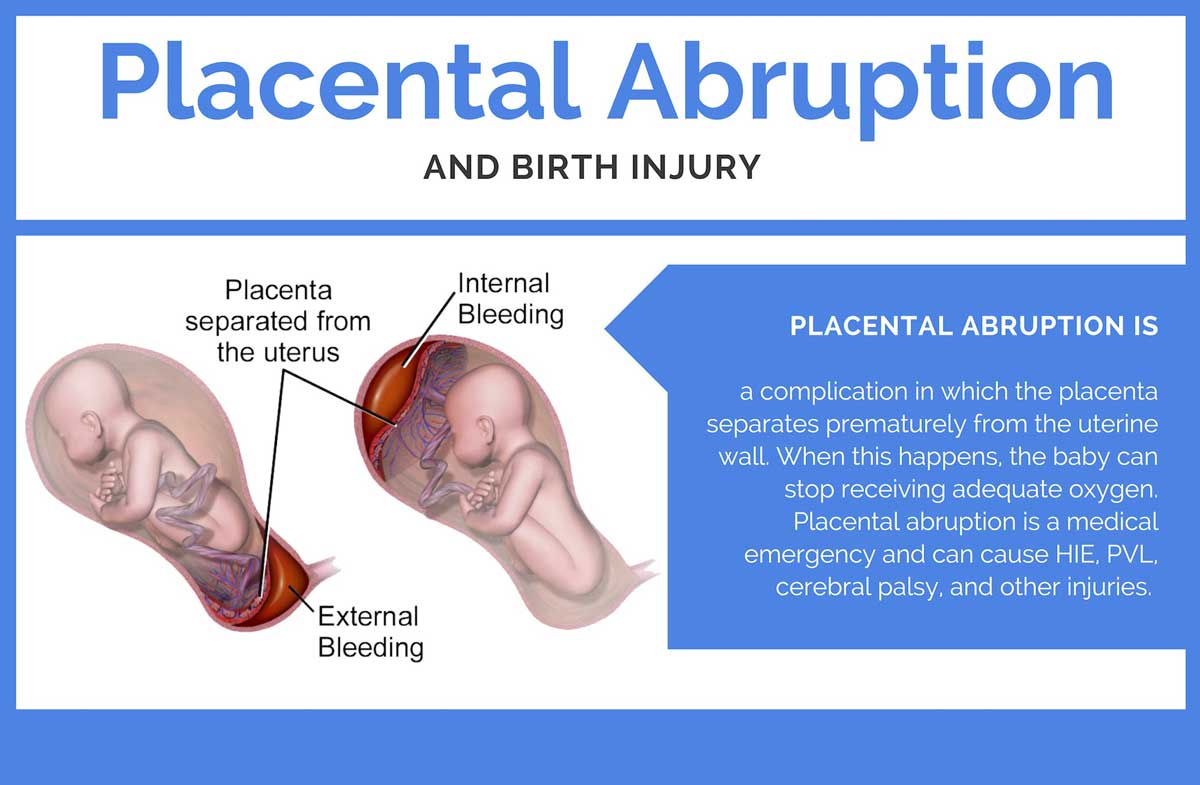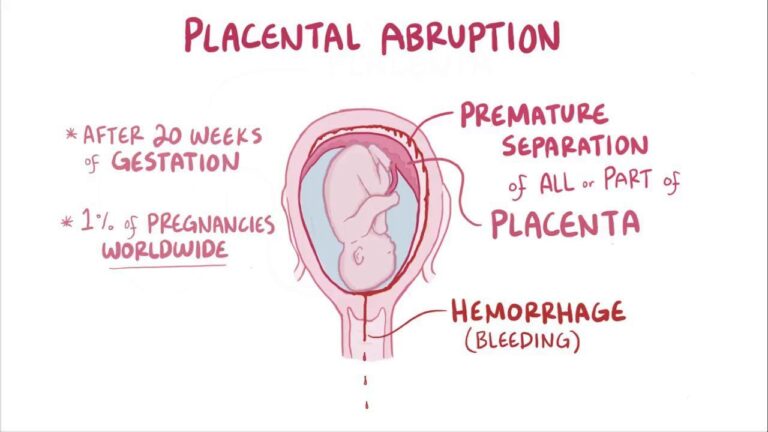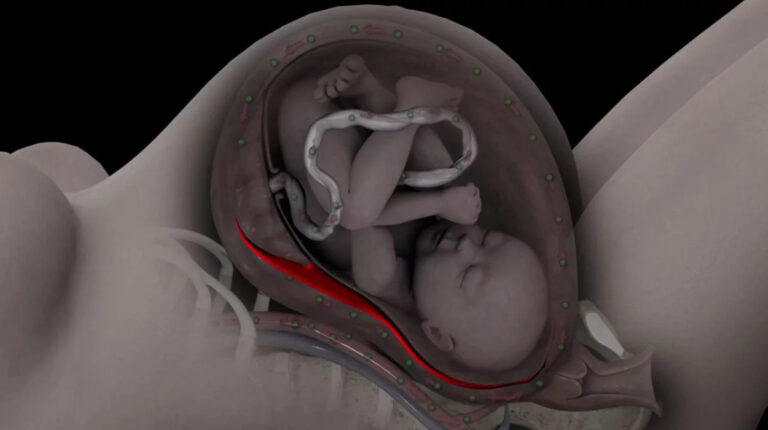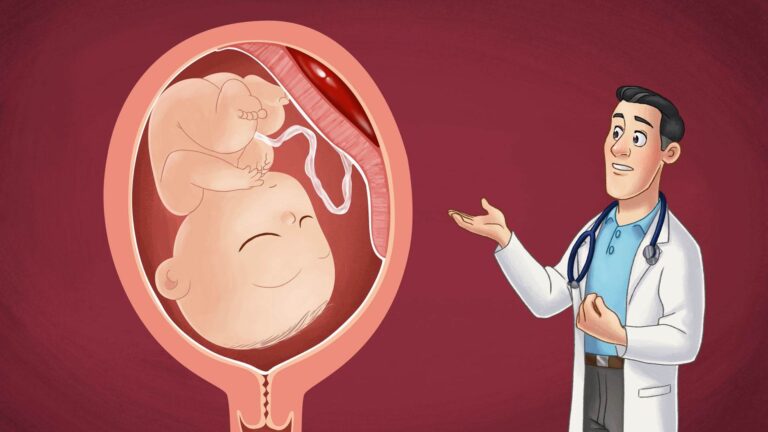PLACENTAL ABRUPTION – SYMPTOMS, CAUSES, AND TREATMENT
Placental abruption (abruptio placentae) is an unusual yet severe complication of pregnancy. The placenta develops within the uterus during pregnancy. It connects to the wall of the uterus and provides the baby with nutrients and oxygen.
Placental abruption happens when the placenta partly or fully separates from the inner wall of the uterus before delivery. It could reduce or obstruct the baby’s supply of oxygen and nutrients and cause heavy bleeding in the mother.
Placental abruption often occurs unexpectedly. If not treated, it endangers both the mother and the baby.

PLACENTAL ABRUPTION SYMPTOMS
Placental abruption is most likely to happen in the last trimester of pregnancy, particularly in the last few weeks prior to birth. Signs and symptoms of placental abruption involve:
- Vaginal bleeding, however, there may not be any
- Abdominal pain
- Back pain
- Uterine tenderness or rigidity
- Uterine contractions, usually coming one right after the another

Abdominal pain and back pain often start unexpectedly. The amount of vaginal bleeding could differ greatly and does not necessarily indicate how much of the placenta has separated from the uterus. It is possible for the blood to become trapped within the uterus, so even with a severe placental abruption, there may be no visible bleeding.
In some cases, the placental abruption develops gradually (chronic abruption), which could cause light, intermittent vaginal bleeding. Your baby may not grow as quickly as expected, and you may have low amniotic fluid or other complications.
WHEN SHOULD YOU SEE A DOCTOR?
Call for emergency care if you have signs or symptoms of placental abruption.
PLACENTAL ABRUPTION CAUSES
The cause of placental abruption is usually not known. Potential causes involve trauma or injury to the abdomen — from an auto accident or fall, for instance — or quick loss of the fluid that encircles and cushions the baby in the uterus (amniotic fluid).
PLACENTAL ABRUPTION RISK FACTORS
Factors that could increase the risk of placental abruption include:
- Placental abruption in a previous pregnancy that was not caused by abdominal trauma
- Chronic high blood pressure (hypertension)
- Hypertension-associated problems during pregnancy, including preeclampsia, HELLP syndrome, or eclampsia
- A fall or other kind of blow to the abdomen
- Smoking
- Cocaine use during pregnancy
- Early rupture of membranes, which causes leaking amniotic fluid prior to the end of pregnancy
- Infection within the uterus during pregnancy (chorioamnionitis)
- Being older, particularly older than 40
 PLACENTAL ABRUPTION COMPLICATIONS
PLACENTAL ABRUPTION COMPLICATIONS
Placental abruption could cause life-threatening problems for both mother and baby.
For the mother, placental abruption could lead to:
- Shock because of blood loss
- Blood clotting problems
- The need for a blood transfusion
- Failure of the kidneys or other organs because of blood loss
- Rarely, the requirement of a hysterectomy, if uterine bleeding cannot be controlled
For the baby, placental abruption could lead to:
- Restricted growth from not getting enough nutrients
- Not getting adequate oxygen
- Premature birth
- Stillbirth
PLACENTAL ABRUPTION PREVENTION
You cannot prevent placental abruption, but you could decrease specific risk factors. For instance, do not smoke or use illegal drugs, like cocaine. If you have high blood pressure, work with your health care professional to monitor the condition.
Always wear your seat belt when you are on board a motor vehicle. If you have had abdominal trauma — from an auto accident, fall, or other injuries — look for immediate medical help.
If you have had a placental abruption, and you are planning another pregnancy, talk to your health care professional before you conceive to see if there are ways to lower the risk of another abruption.
PLACENTAL ABRUPTION DIAGNOSIS
If your health care professional suspects placental abruption, he or she will do a physical examination to check out for uterine tenderness or rigidity. To help discover potential sources of vaginal bleeding, your provider will probably suggest blood and urine tests and ultrasound.
During an ultrasound, high-frequency sound waves create a picture of your uterus on a monitor. It is not always possible to see a placental abruption on an ultrasound, however.

PLACENTAL ABRUPTION TREATMENT
It is not possible to reconnect a placenta that is separated from the wall of the uterus. Treatment options for placental abruption depend upon the circumstances:
The baby is not close to full term – If the abruption seems mild, your baby’s heart rate is normal and it is too early for the baby to be born, you may be hospitalized for close monitoring. If the bleeding stops and your baby’s condition is normal, you may be able to rest at home.
You may be given medicine to help your baby’s lungs mature and to protect the baby’s brain, in the case early delivery becomes necessary.
The baby is close to full term – Generally, after 34 weeks of pregnancy, if the placental abruption appears minimal, a closely monitored vaginal delivery may be possible. If the abruption gets worse or endangers your or your baby’s health, you will need an immediate delivery — generally by C-section.
For severe bleeding, you may require a blood transfusion.
If you or anyone you know is suffering from placental abruption, our expert providers at Specialty Care Clinics will take care of your health and help you recover.
Call (469) 545-9983 to book a telehealth appointment for an at-home check-up.
